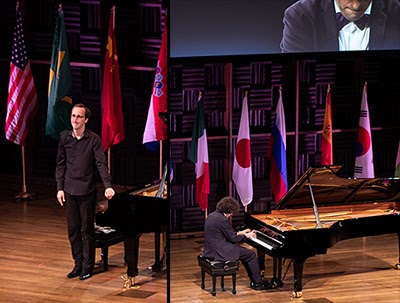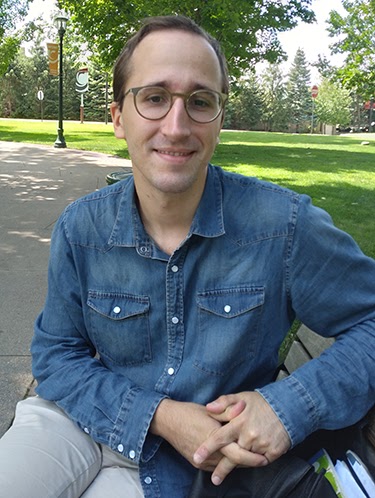by Mike Telin

The first phase is the Chamber Music Round which continues tonight at 7:00 pm in Gartner Auditorium at the Cleveland Museum of Art. Lovre Marušić and Martín García García both perform Shostakovich’s Piano Quintet in g, Op. 57 with the Escher Quartet. In-person and virtual tickets are available here.
On Monday morning the finalists were invited to select either a New York or Hamburg Steinway for their Chamber Music Rounds. The Hamburg won three to one. After their selections were made, I had the opportunity to sit down with each contestant for one-on-one conversations in Wade Oval.
Today we hear from Lovre Marušić and Martín García García. Their responses have been edited for clarity.
Lovre Marušić
We began by talking about soccer, specifically the recent European Championships and Copa América. We were both happy to see Lionel Messi win his first major title with his national team. Next we moved onto CIPC.
Mike Telin: With the first two rounds being held virtually, how did you feel when you were notified that you should make plans to come to Cleveland?
Lovre Marušić: Of course I was really happy. I was chosen for the Leeds, Busoni, and Cleveland competitions, so when I found out I was a semifinalist here, I decided to make Cleveland my priority. And I think I made a good choice.
MT: I enjoyed your English Suite during the Second Round very much.

MT: I also enjoyed your Haydn — Sonata in b, Hob. XVI: 32 — in the first round. We don’t get to hear enough of his sonatas, at least here.
LM: Exactly. It’s that way everywhere. I think the sonata I played deserves the same credit as some of Beethoven’s sonatas.
MT: And your semifinal performance was beautiful from start to finish. But how do you wrap your head around a piece as big as Kreisleriana?
LM: It is one of the more genius pieces ever written, not just in the Romantic period. It is a masterpiece like the Goldberg Variations. It’s so complex with so much polyphony like in Bach, which is why it is extremely difficult for the head. You need to be totally inside of it during a performance.
It is like people — we have our good moments and bad moments and you hear a lot of that in the piece. There’s a lot of death, fighting, and especially in the middle section, dreaming. And the last movement is in another world — it’s kind of like a reincarnation of the soul which reaches its destination in the last note. That is the way I see it now, but in ten, fifteen years, I may play it differently.
MT: What are your thoughts about Freddie Mercury as a composer?
LM: He was a revolutionary at that time with Bohemian Rhapsody. And the idea for commissioning the transcription, for me at least, is great because I think it works really well for the public. I can perform it as an encore. But it was difficult to play it so close to Kreisleriana.
MT: I thought the duo piano was a fun addition to the competition.
LM: Yes. And it shows if you can play chamber music. Other pairs played the Schubert Fantasy, which I think is even more difficult than the Mozart. So we were lucky that we got the Mozart, because with two pianos you have more freedom.
Byeol Kim was great to work with. It was fun because we were not so obsessed with the jury, we were trying to play it for the public. And to be honest, I was very satisfied.
MT: Tomorrow night you’ll play your Chamber Music Round with the Escher. Why did you choose the Shostakovich?
LM: Because, as you have heard, it is totally different from a lot of my repertoire. I’ve played Scarlatti, Haydn, Bach, and Schumann, so I decided to play something Russian.
It is different from, say, the Brahms and Schumann in that you need to create the atmosphere. There are a lot of dissonances, and it does have a cold feeling and sometimes scary emotions. I don’t know the Escher, but I hear they are fantastic and I look forward to working with them.
MT: And on Saturday it’s Beethoven 4 with The Cleveland Orchestra.
LM: This concerto is another genius piece. I’ve played it a lot in competitions and I’ve had success, so let’s hope it’s the same here. It is difficult to do it on one rehearsal, but everyone only has one rehearsal. Cleveland is an amazing orchestra and I think they will help me, so I’m certain we will have a great time together.
MT: Is there anything else you would like to tell me?
LM: Just that I hope the memory of this competition will stay with me for a long time. I’m very thankful to Yaron Kohlberg and the whole organization. A big thank-you to everyone.
Martín García García
Mike Telin: Congratulations on all of your successes.
Martín García García: Thank you so much.
MT: In addition to Cleveland you were also accepted to the Queen Elisabeth, Chopin, and Arthur Rubinstein competitions. That’s great.

MT: Are you able to keep the same repertoire?
MGG: Not at all. The requirements are quite different at all of them — it’s a delicate balancing act.
I think I speak for every pianist in that we all have pieces that belong to the different eras of music history, so it is easy to adapt. Unless the competition asks for something really crazy, which is unusual because they all steer toward more Romantic and Classical repertoire. But everybody has more than one Beethoven sonata in their repertoire — it’s the same for Chopin etudes.
MT: And thank you for not playing “Winter Wind.”
MGG: Yes, everybody goes to the same etudes. I understand that they are masterpieces, but after hearing something 50 times, it’s like using the same word over and over — it starts losing its meaning.
MT: You played a wonderful Schubert “Wanderer,” but it is a lot for a listener to take in.
MGG: Many people say that. Nowadays it is not thought of as experimental music, but at the time, the music of Beethoven, Schumann, Schubert, and Liszt was experimental.
It takes a long time to figure out how to make some of their pieces come together. But I have been living with the Schubert for ten years. I am 24, so I grew up with it. But yes, it can be difficult to process.
MT: How did you feel about the arrangement of Bohemian Rhapsody being part of a competition?
MGG: There’s always a requirement to play a modern piece, something to make each competition special. But this was actually a lot of fun and I think that was the point. We should just have fun and stop thinking so much.
But it’s not an easy piece. I did find the primary recording that Kurbatov used — it’s the one from the official music video. He kind of made a polyphonic arrangement and then glued everything together, which is very interesting.
MT: I like the way he worked in the guitar solos.
MGG: That was funny to see in the score. You needed to think, ‘Okay, this is a guitar solo, you shouldn’t play it like a classical musician.’
MT: And the duo piano portion?
MGG: That was fun too. Many people said they were actually excited about playing it. It was very nice because it also gave us a way to disconnect from our own program and do something else related to music. I think I can say for all of us that we enjoyed it.
MT: For your Chamber Music Round you’re playing Shostakovich. Why did you choose it?
MGG: It goes with the Rachmaninoff concerto that I’m playing. Until two years ago I only had Russian professors. So I’ve grown up with Russian music my entire life, and Russian music is very close to me. I am fully Spanish, my brain is Spanish, but there is a little place back here (points to the back of his head) that is fully Russian.
MT: You’ve played it before?
MGG: Yes, but not as much as I would like. We have one two-hour rehearsal and then the performance. I wish it were more but I understand that sometimes life is like this. For everyone it’s the same. And I look forward to playing with the Escher.
MT: Are you thinking about playing Rachmaninoff 3 with The Cleveland Orchestra on Saturday night?
MGG: I am thinking about it. For some reason this concerto seems like a mountain to climb, so we do need the mental preparation, not only the physical.
As a kid I saw the music and I thought that I’d never get to the top of the mountain. When I started working on it I took my time, maybe around a year. It makes a difference if you take your time — it’s like growing another arm. But it is one of my favorite pieces.
MT: Of course we’re always waiting to hear what the soloist is going to do with the first-movement cadenza.
MGG: (laughs) Actually Rachmaninoff said that he’d rather not play that cadenza because it is too much, and Horowitz didn’t play it either.
It’s like an entire piece by itself, and trying to glue it together with the rest of the movement is something that is quite difficult. Everything leads to the cadenza and then stops, and it becomes its own mountain in the middle of the movement. It’s also difficult to make it work in your ear, and I think that’s the biggest challenge.
I grew up listening to the recordings of George Szell and The Cleveland Orchestra. And I have many friends in Hungary who are also very conscious of George Szell. The power of having an orchestra behind you is always something special, but I am really looking forward to this one.
Published on ClevelandClassical.com August 4, 2021.
Click here for a printable copy of this article


